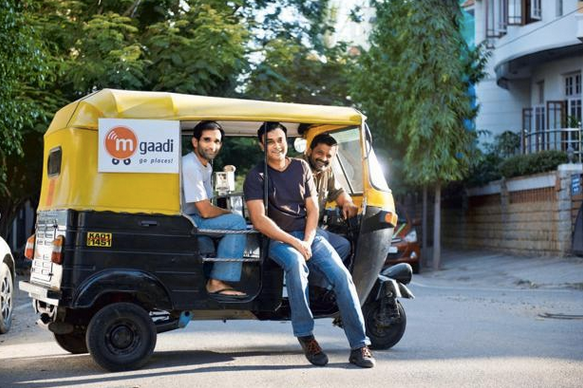Everyone in the US seems to be buzzing about the on-demand economy. SherpaVentures just raised $154M to fund the next Uber, and they’ve published an extremely comprehensive market report on the opportunities for disruption in transportation, real estate, labor and retail.

Liz Gannes of Re/code published a five-day series on what she calls the instant gratification economy. In the series, she highlights how you can now order almost anything imaginable – be it a gourmet lunch from Sprig or SpoonRocket or your favorite toothpaste from WunWun or InstaCart – and have it delivered before you can change out of your pajamas. And a few days ago Josh Breinlinger of SigmaWest responded with tips for improving speed metrics of on-demand services in his blog.

Well, I believe the on-demand economy is buzzing in India too. India is arguably home to the oldest and most sophisticated on-demand economy in the world. Founded 125 years ago, the Mumbai dabbawallas deliver over 200,000 lunches from customers’ homes to their offices every single day. Legendary enough to warrant an HBR case study, today 5,000 dabbawallas (aka deliverymen or literally “one who carries a box”) deliver meals with 99.9999% accuracy. Somehow existing without an app (gasp! Although I think it actually makes it more impressive), dabbawallas have avoided “Uber for X” fandom.
With technology involved, I’d bet San Francisco holds the award for most on-demand apps per capita. The city is a petri dish for on-demand experimentations – it’s geographically condensed, wealthy, full of time-crunched workers, and has high smartphone adoption. But as the “Silicon Valley of India” and with a population 10 times as large, there’s no reason Bangalore can’t become the global leader of the on-demand economy.
India already has several on-demand services. There’s Ola Cabs, Meru, Taxi4Sure and now even Uber competing in the market for transportation apps. In Mumbai, TimeSaverz offers a localized version of TaskRabbit, and Grab-a-Grub delivers food from over 150 restaurants to your doorstep in less than 60 minutes. Companies like BlowHorn and Wassup Laundry are disrupting logistics and laundry, and the list goes on. India has lower smartphone adoption rates than San Francisco, so many of these services are accessed via SMS, missed call or phone calls, instead of apps – a natural adaptation to the market. Maybe someday I’ll be lazy enough to require an app to reserve my on-demand in-home foot massage, but for now, calling HapppyFeet works just fine.

And I might be a sucker for Uber’s competitive pricing and seamless payment process, but I’m also excited about mGaadi, a company that Unitus Ventures, the early-stage impact venture I work for, recently invested in. mGaadi is building the “Uber for auto rickshaws”. When I open the app to request a ride, a three-wheeled rickshaw arrives at my office within 10 minutes. Usually as a foreigner, I’m turned down or charged double for rides in an auto, but mGaadi guarantees that drivers adhere to the metered fare.
What excites Unitus Ventures about the impact of this investment is that beyond offering a scalable product, mGaadi formalizes an informal economy. Auto drivers currently find rides on an ad hoc basis, but mGaadi’s reliable stream of customers leads to higher hourly earnings. Drivers typically earn 200 rupees a day (~$3), but now they can either reach their daily target in less time or increase their daily earnings by 2–3x. In less than a year, mGaadi already supports 5,000 low-income drivers, and they hope to reach 50,000 by the end of next year. Gannes’ article mentions a delivery boy driving a BMW in SF, but in India it’s more (100% more) likely that on-demand economy companies are employing or supporting large groups of low-income workers earning less than $4/day. This creates a huge opportunity for startups to scale while improving livelihoods for millions of people through higher wages and steadier jobs.
In the US, the on-demand economy undoubtedly improves efficiency, but for the most part, it disrupts industries that are already functional and regulated (think Uber vs. taxi medallion owners & Airbnb vs. hotel chains). In India and other emerging markets, the on-demand economy is especiallyexciting and disruptive, because it enables informal economies to leapfrog into the future. Industries remain decentralized (i.e. skip expensive storefronts and bureaucratic approvals), while still benefiting from increased marketplace efficiencies. In the same way that M-Pesa enabled Kenyans to setup savings accounts without bank branches, the on-demand economy is improving market efficiencies at a rate never before imagined.
Bear in mind, localizing on-demand services to the Indian market is not seamless. Horrible rush hour traffic and road infrastructure, spotty cellphone reception during monsoon, and lower adoption of smartphones are just a few of the challenges entrepreneurs encounter. Another obstacle is the RBI’s restrictions on recurring credit card payments, making it hard for India-based companies to store credit card information and offer easy one-click checkouts. That being said, these inefficiencies create even more value for disruption.
Last year VC’s invested $1.6 billion into 117 on-demand economy companies, but only $3 million of that was outside of the US. At Unitus Ventures, we believe that number is set to grow, and we are excited to work with entrepreneurs finding opportunities in the on-demand impact economy.
Read more in our Mobile Commerce Sector>

